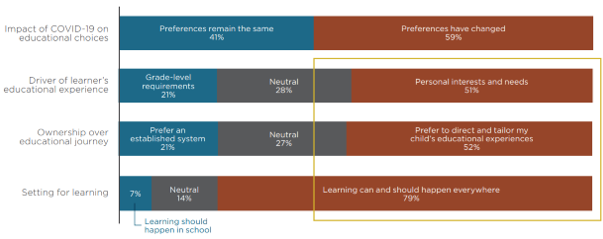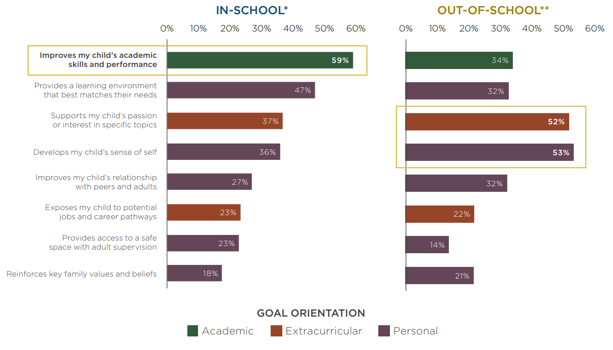 The Covid-19 pandemic proved that K-12 education was ripe for disruption. A new report from Tyton Partners finds that a majority of parents “prefer to direct and curate their child’s education rather than rely on local school systems.”
The Covid-19 pandemic proved that K-12 education was ripe for disruption. A new report from Tyton Partners finds that a majority of parents “prefer to direct and curate their child’s education rather than rely on local school systems.”
With many families educating their children at home during the crisis, parents discovered learning and personal growth can happen everywhere, not just in the classroom. Not only are parents choosing where, and how, their children are educated; they also are making choices on extracurricular activities like camp, tutoring, cultural enrichment and sports.
Could educational choice and extracurricular choice coexist, and how might it work?
Tyton Partners, with the Walton Family Foundation and Stand Together Trust, set out to find answers to these questions with a new report, “Choose To Learn: Connecting In- And Out-Of-School Learning In A Post-Pandemic World.”
Researchers surveyed more than 3,000 parents and nearly 150 organizational leaders who offer in-school and out-of-school educational programs.
According to the survey, the pandemic fundamentally changed the way parents view K-12 education.
Parents’ values and beliefs toward K-12 learning

While parents still believe in-school learning is the greatest means of improving a child’s intellectual opportunity, Tyton Partners found that parents viewed out-of-school activities to be far better at supporting a child’s passions of interest and developing a child’s sense of self-worth.
Out-of-school activities were viewed as being better at helping students develop relationships with peers and adults and reinforcing key family values and beliefs. These out-of-school style activities may even be blended into non-traditional educational models, such as microschools or other alternative educational programs.
Top aspirations for child’s learning
 Given the positive benefits of these out-of-school activities, researchers reviewed concerns over equitable access to extracurricular activities and alternative schools by minorities or low-income families. Alternative school options and extracurricular activities also remain unaffordable to most families, regardless of race or income.
Given the positive benefits of these out-of-school activities, researchers reviewed concerns over equitable access to extracurricular activities and alternative schools by minorities or low-income families. Alternative school options and extracurricular activities also remain unaffordable to most families, regardless of race or income.
Researchers provide two solutions to making alternative educational models and extracurricular activities more affordable: education savings accounts (ESAs) and public microgrants.
ESAs would provide funds directly to parents to pay for tuition, tutoring and other afterschool activities like camps, museum trips, sports and more. Microgrants include programs like VELA Education Fund offering grants to educational entrepreneurs, or Boston Public Schools’ “Opportunity Portfolio,” which provides grants to community organizations and enrichment programs to serve local students.
In addition to resolving equity issues, the researchers examined accessibility and quality issues as well.
Overall, the research launched to gain a better understanding of issues impacting every family, including the more than 40 million parents who send their children to public school, according to Christian Lehr, senior principal at Tyton Partners and lead author of the report.
“Relative to issues of equity and access, our local public districts play a crucial role for K-12 families,” Lehr said. “At the same time, families crave a wide variety of learning experiences. It is in this spirit that we examined parents’ aspirations at the intersection of in- and out-of-school learning, and ask: How can the K-12 sector deliver a stronger union of academic, extracurricular, and personal outcomes for all families, regardless of life or economic circumstances?”